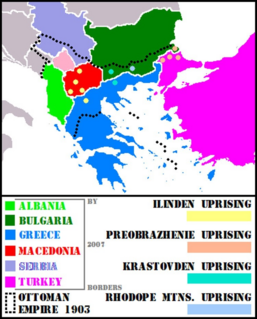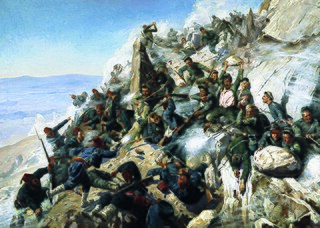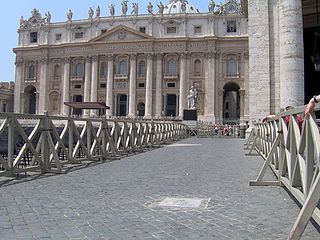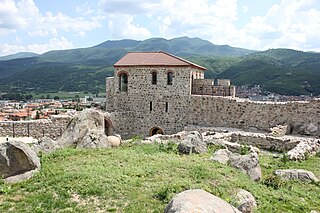
Alexander Joseph, known as Alexander of Battenberg, was the first prince (knyaz) of the Principality of Bulgaria from 1879 until his abdication in 1886.

Elections to the European Parliament were held between 10 and 13 June 2004 in the 25 member states of the European Union, using varying election days according to local custom. The European Parliamental parties could not be voted for, but elected national parties aggregated in European Parliamental parties after the elections.

Naim Süleymanoğlu, born in Bulgaria as Naim Suleimanov, was a Turkish world and Olympic Champion in weightlifting, who was nicknamed “The Pocket Hercules” because of his small stature of 1.47 m. In the 1988 Summer Olympics, he set a record by lifting 190 kg in the clean and jerk. He was awarded the Olympic Order in 2001. In 2000 and 2004, he was elected a member of the International Weightlifting Federation Hall of Fame.

The Ilinden–Preobrazhenie Uprising or simply the Ilinden Uprising of August 1903, was an organized revolt against the Ottoman Empire, which was prepared and carried out by the Internal Macedonian-Adrianople Revolutionary Organization. The name of the uprising refers to Ilinden, a name for Elijah's day, and to Preobrazhenie which means Transfiguration.

Bulgaria elects on national level a head of state - the president - and a legislature. The president is elected for a five-year term directly by the people. The National Assembly has 240 members, elected for a four-year term by proportional representation in multi-seat constituencies with a 4% threshold. Bulgaria has a multi-party system, in which no one party often has a chance of gaining power alone, and parties must work with each to form governments.

The Battle of Shipka Pass consisted of four battles that were fought between the Russian Empire, aided by Bulgarian volunteers known as opalchentsi, and the Ottoman Empire for control over the vital Shipka Pass during the Russo-Turkish War (1877–1878). The crucial moment came in August 1877, when a group of 5,000 Bulgarian volunteers and 2,500 Russian troops repulsed an attack against the peak by a nearly 40,000 strong Ottoman army.

Attack is a Bulgarian nationalist party, founded by Volen Siderov in 2005, who was at the time presenter of the homonymous TV Show "Attack" on SKAT TV. There are different opinions on where to place the party in the political spectrum: according to most scholars it is extreme right, according to others extreme left, or a synthesis of left- and right-wing. The leadership of the party asserts that their party is "neither left nor right, but Bulgarian". The party is considered ultranationalist and racist, especially antisemitic and anti-Roma, as well as xenophobic, especially anti-Muslim and anti-Turkish. The party opposes the Bulgarian membership in NATO and requires revision for what it calls the 'double standards' for the membership in the European Union, while members visit international Orthodox and anti-globalization congresses and the party is closely tied with the Bulgarian Orthodox Church. It advocates the re-nationalisation of privatised companies and seeks to prioritize spending on education, healthcare and welfare.

The Green Party is a centre-left political party. It was founded in 1989 in Sofia as the Green Party of Bulgaria. The initiator for the establishment of the party and its long-time chairman was Alexander Karakachanov.

GERB is a conservative, populist Bulgarian political party established on 13 March 2006. The initials of the party герб/gerb also translate as "coat of arms" in Bulgarian. It is Bulgaria's second-largest party by membership.

The first attempted assassination of Pope John Paul II took place on Wednesday, 13 May 1981, in St. Peter's Square in Vatican City. The Pope was shot and wounded by Mehmet Ali Ağca while he was entering the square. The Pope was struck four times and suffered severe blood loss. Ağca was apprehended immediately and later sentenced to life in prison by an Italian court. The Pope later forgave Ağca for the assassination attempt. He was pardoned by Italian president Carlo Azeglio Ciampi at the Pope's request and was deported to Turkey in June 2000.
Football is the most popular sport in Bulgaria. It was introduced in 1893–1894 by Swiss gymnastics teachers invited to the country. A football match was first played in Varna's High School for Boys in 1894, where it was introduced by Georges de Regibus, and the game was brought to Sofia by Charles Champaud the following year. The rules of the game were published in Bulgarian by Swiss teachers in the Uchilishten pregled magazine in 1897, and football continued to gain popularity in the early 20th century. Among the founders of the Turkish team Galatasaray S.K. in 1905 was the Bulgarian Lycée de Galatasaray student Blagoy Balakchiev, and the first Bulgarian club, Futbol Klub, was established in Sofia in 1909 on the initiative of Sava Kirov. PFC Botev Plovdiv was founded in 1912, PFC Slavia Sofia in 1913, and PFC Levski Sofia in 1914. The Bulgaria national football team debuted on 21 May 1924 in a 1924 Summer Olympics qualifier, losing 0–6 to Austria in Vienna. What is today PFC CSKA Sofia was established on 5 May 1948. In the 1950s and 1960s Bulgarian football achieved its biggest Olympic success, being third in the 1956 Summer Olympics in Melbourne and second in the 1968 Summer Olympics in Mexico City, also finishing fifth in Euro 1968. In 1962, Bulgaria first qualified for a FIFA World Cup tournament, in total of seven participations to date. In the 1986 FIFA World Cup, Bulgaria did reach the round of 16. Then, in the 1994 FIFA World Cup, came Bulgaria's biggest World Cup success, the fourth place, the elimination of reigning world champions Germany and Hristo Stoichkov's top goalscorer prize.

Pierce Charles de Lacy O'Mahony, known up to 1901 as Pierce Mahony, and from 1912 also as The O'Mahony of Kerry, was an Irish Protestant nationalist politician and philanthropist, who practised as a barrister from 1898 to 1900. He was remarkable in having had successively three names, two wives and three faiths, and for being honoured by the Kings of two opposing countries in World War I.

Parliamentary elections were held in Bulgaria on 5 July 2009. With 40% of the vote, the decisive winner of the elections was the established in 2006 personalistic party of Boyko Borisov - GERB. The Socialist Party, in power before the election, was in second place, with around 18%. Оnce-ruling National Movement Simeon II did not cross the 4% threshold and won no seats. The turnout was 60.2%, one of the lowest ever. Following the election, GERB leader Boyko Borisov became Prime Minister. Just like all the previous parliamentary elections since the fall of communism, the government was not re-elected.
Heathcote was a 19th-century parliamentary electorate in Christchurch, New Zealand.

Parliamentary elections were held in Bulgaria in January and February 1880. Low voter turnout in some constituencies led to the results being invalidated and the elections re-run. Unlike in former elections, the government did not attempt to influence the result, resulting in the opposition Liberal Party retaining their majority in the National Assembly. Of the 162 seats, the Liberal Party won 103 and the Conservative Party won 50. When the newly elected Assembly convened, Liberal Party member Petko Karavelov was elected Chairperson.

Constitutional Assembly elections were held in Bulgaria in April 1893. The body known as the Grand Sobranye was convened for a fourth time in order to consider several amendments to the constitution, including ones concerning the religion of the monarchy and a reduction in the number of members of the National Assembly.

Boyko Metodiev Borisov is a Bulgarian politician who has been serving as the 50th Prime Minister of Bulgaria since 4 May 2017. He had previously held the post of Prime Minister on two separate occasions, from 2009 until 2013 and from 2014 until January 2017. He was also the Mayor of Sofia from 2005 to 2009.

Parliamentary elections were held in Bulgaria on 5 October 2014 to elect the 43rd National Assembly. GERB remained the largest party, winning 84 of the 240 seats with around a third of the vote. A total of eight parties won seats, the first time since the beginning of democratic elections in 1990 that more than seven parties entered parliament. Boyko Borisov then became prime minister as head of a coalition with the Reformist Bloc and with outside support from the Patriotic Front and the Alternative for Bulgarian Revival.


















